
BFI London Film Festival 2025 Reviews: No Other Choice, Rental Family and more!
Better late than never, we suppose, but we’ve finally come to the end of our coverage of this year’s edition of the BFI London Film Festival, and once more we are bringing you reviews of some of the remaining titles that brought up right up to the closing night!
And if you want a refresher of what else might have been playing, click here to check out the BFI London Film Festival’s official website!
So click the hyperlinks below to read our third and final batch of LFF reviews for the year!
Is This Thing On? (dir. Bradley Cooper)
Click To Read Our Review For Is This Thing On?
WHO’S IN IS THIS THING ON? Will Arnett, Laura Dern, Andra Day, Bradley Cooper, Amy Sedaris, Sean Hayes, Christine Ebersole, Ciarán Hinds, Scott Icenogle, Chloe Radcliffe, Jordan Jensen, Peyton Manning, Reggie Conquest, James Tom, Gabe Fazio, Blake Kane, Calvin Knegten, Derek Gaines, Matt Richards
WHO’S BEHIND THE CAMERA? Bradley Cooper (director, writer, producer), Will Arnett (writer, producer), Mark Chappell (writer), Weston Middleton and Kris Thykier (producers), James Newberry (composer), Matthew Libatique (cinematographer), Charlie Greene (editor)
WHAT’S IT ABOUT? A middle-aged divorcee (Arnett) dips his toes into the stand-up comedy scene…
WHAT ARE MY THOUGHTS ON IS THIS THING ON?
Love is clearly a theme of choice for Bradley Cooper, whose three directorial outings thus far – A Star is Born, Maestro and now Is This Thing On? – have all been romances, albeit ones of various tones each time. The form of love in the latter film differs greatly from the tragic nature of A Star Is Born as well as the more artisanal biopic flavour of Maestro, with it being not just between a central couple with an unmistakable bond despite what they may tell themselves, but also between someone discovering a passion for something they never thought was even a possibility.
That makes Is This Thing On? a wonderful surprise from Cooper, more so than his other movies, as his naturalistic approach works wonders for a more grounded story about what it is to find and rediscover love, while also having a good old laugh about it all.
Cooper’s film begins with the revelation that married couple Alex (Will Arnett) and Tess (Laura Dern) have mutually decided to separate, with Alex moving to a small one-bed apartment while Tess stays in their suburban house to look after their two young sons. Despite the split, Alex and Tess remain fairly close to one another, though Alex is clearly going through a rough transition into singledom, which he suddenly finds an outlet for when he wanders into the stand-up comedy circuit, and expresses a keen interest in getting up on stage and translating his marital woes into humorous material. Tess, meanwhile, is juggling whether to return to her career in sports as a coach, having previously served on the US Olympics volleyball team, but her own regrets about making the decision to step away from her husband like she did from athleticism when she married him end up clouding her own assurances.
Both their worlds end up colliding in potentially cataclysmic fashion, though director Cooper avoids utter devastation by harmonising the arcs of his two central characters with a fair combination of humour and heart. As Arnett’s Alex progresses through the stand-up circuit, befriending many other comedians who are similarly struggling to find consistent work (many of whom are played by actual stand-ups from within the industry), you can feel his zest for life slowly returning to him as his newfound passion brings out the kind of man that Tess originally fell in love with. She, meanwhile, is struggling with what to do with herself now that she’s retained her single status yet is still seen as the primary caregiver to their sons in a life that already allows her little room to breathe. Both are drawn closer to one another, possibly more than during their happier days as a couple, thanks to their reconnection with their past selves, although there is concern that what they may still admire about one another has since eroded with age, and that who they may have been when they first started going out might not necessarily be who they are now.
Cooper, who along with Arnett and Mark Chappel also co-wrote the script – which, oddly enough, is loosely based on the early career of comedian John Bishop; they make up for the significant location change by placing Arnett in a Liverpool Football Club vest at one point – taps into the central rom-com elements with a refreshingly mature approach. Neither Alex nor Tess are presented as wholly right in their decisions but at the same time they’re also far from wrong, and the director explores their tender yet fragile connection that prompts a series of circumstances that allow them to talk things through via rational conversation, through a pleasingly naturalistic aesthetic where such conversations feel real and authentic, thanks to strong work by both Arnett and Dern as they convey the bubbling pressure within their characters to sort themselves out before giving each other a possible new chance.
Most of all, unlike other movies like Joker, Funny Cow and The King of Comedy, this is a film about stand-up comedians that isn’t a complete downer and is actually, well, funny. A good chunk of the humour comes from not the stand-up sets themselves – though there are certainly some great monologues and performances that earn plenty of laughs – but from how increasingly unnerved both protagonists find themselves to be as a result of their actions, and Cooper delivers sharp timing where the slightest infliction of voices can generate some form of laughter. Some of that actually comes from Cooper himself, as he also fills the supporting role of Alex’s constantly aloof actor friend Balls – and yes, that is how the character is credited – whose own problems with spouse Christine (Andra Day, who herself gets a few moments to shine) lead to moments of attention-grabbing slapstick that earn fine reactions.
While the film is funny, easily the most humorous of Cooper’s directorial career thus far, it is much more impactful as a love story, which as we’ve come to realise is the director’s specialty. Like his previous films, although not quite to the extent of A Star Is Born, Is This Thing On? revels in a genuinely charming romance where the spark between its two leads is more than apparent, and you enjoy going on this wacky journey with two characters whose love for one another is given the necessary kiss of life for them to grow closer than ever. That, in and of itself, is an achievement that’d be hard to truly joke about.
SO, TO SUM UP…
Is This Thing On? is filmmaker Bradley Cooper’s funniest film to date, while also being a legitimately sweet romance between Will Arnett and Laura Dern whose chemistry, along with their director’s naturalistic style, powers the slight yet identifiable narrative.
⭐⭐⭐⭐
No Other Choice (dir. Park Chan-Wook)
Click To Read Our Review For No Other Choice!
WHO’S IN NO OTHER CHOICE? Lee Byung-Hun, Son Ye-Jin, Park Hee-Soon, Lee Sung-Min, Yeom Hye-Ran, Cha Seung-Won, Yoo Yeon-Seok
WHO’S BEHIND THE CAMERA? Park Chan-Wook (director, writer, producer), Lee Ja-Hye, Lee Kyoung-Mi and Don McKellar (writers), Cho Young-Wuk (composer), Kim Woo-Hyung (cinematographer), Kim Sang-Bum (editor)
WHAT’S IT ABOUT? A desperate unemployed man (Byung-Hun) sets out to eliminate his competition for a new job…
WHAT ARE MY THOUGHTS ON NO OTHER CHOICE?
I’m not going to lie to you: No Other Choice was very difficult to sit through for me. Not that I found the movie to be bad – quite the opposite, in fact – but as someone who’s been in a state of unemployment for longer than I’d care to admit, it was more than a little uncomfortable to watch those feelings of inadequacy and desperation whilst searching for suitable and steady work play out in such an honest and all-too real manner.
Discomfort is certainly one of the many things that South Korean filmmaker Park Chan-Wook wants the viewer to feel whilst watching his latest movie, regardless of whether you’re comfortably employed or, like me, still searching for the perfect money-earning position, but none are more necessary than that of laughter. The macabre kind of laughter, to be precise, as Chan-Wook’s dark comedy depicts the universal struggle to find work as a hilarious yet soul-destroying ritual that can lead people to do increasingly unhinged things in order to get ahead of everyone else.
We begin with Yoo Man-soo (Lee Byung-hun) and his family, including wife Lee Mi-ri (Son Ye-Jin) and their young kids, enjoying a comfortable life that is funded by his 25-year stint as a manager at a top paper company, a role that he is abruptly dismissed from during a company-wide layoff. Months pass, and Man-soo is unable to find work that comes anywhere close to the level of skill and salary he’s spent years working towards, forcing the family to make numerous sacrifices like giving away their pet dogs and, in the most heartbreaking case of all, being forced to put up for sale their house which Man-soo also grew up in. He eventually learns of what could be the perfect position at another successful paper factory, as well as the numerous other candidates who could potentially be picked instead, so Man-soo sets out on a thoroughly misguided mission to literally eliminate the competition.
Chan-wook is at his most outwardly comedic with No Other Choice, a film that takes sharp satirical aim at the ruthlessness of modern-day capitalism and the lengths one goes to get a mere taste of success. It’s a lot of fun, as the filmmaker employs his overt visual style to a wild caper with a murderous edge, one that compliments the fragmented and beautifully chaotic journey that our delirious anti-hero embarks on. The style heightens the comedy while also not completely distracting from it, as Chan-wook carefully balances the tone with steadily paced moments where you get to see things from other characters’ point of view, including the potential victims of Byung-hun’s Man-soo, making later moments feel all the more uncomfortably funny given that you now understand some of the context surrounding such parts.
There are enjoyable layers to peel back as Chan-wook pays close attention to how the cutthroat economic environment slowly corrupts not just Man-soo, whom Byung-hun portrays with oodles of uncouth energy, but those who are also indirectly affected by their desperation. In particular, his wife Mi-ri finds herself in a number of undesirable positions thanks to her husband’s lack of financial stability, so when she inevitably begins to catch onto his disturbing after-hours activities, the film raises some interesting questions about whether or not to turn a blind eye to these extreme and very much criminal revelations if, at the end of the day, it means she and her family can reclaim the life they have lost. All of these characters, in one way or another, have been so poorly treated by the system that they’ve had to resort to animalistic tendencies in order to regain their lost stability, namely becoming predatory creatures targeting their helpless prey, a concept that Chan-wook wisely doesn’t push to similar extremities but nonetheless enjoys conveying through sheer madcap energy.
As to be expected from Park Chan-wook, No Other Choice is incredibly stylish, complete with most of the filmmaker’s attributes like flashy scene transitions and moments of dreamlike surreality that are accompanied by colourful cinematography. For those who may have been a bit iffy on the filmmaker’s style in past films, I don’t see this film swaying many of those people, because his is a very overt approach that can often distract from the storytelling and sometimes even feel as though there’s little reason for it to be there at all, and the style in this film is no different. I remember having similar issues with Chan-wook’s previous film Decision to Leave, an otherwise straightforward Hitchcockian thriller that I initially struggled to get on board with due to its overly flamboyant style that didn’t quite match the material. While I found the integration of the director’s style in No Other Choice to be all around smoother, there were times when I could feel myself starting to be taken out of the story being told and being forced to sit through yet more of Chan-wook’s attention-grabbing artistry.
To reiterate, I enjoyed No Other Choice quite a bit, and for my money it’s his best feature since 2015’s The Handmaiden, possibly even since his 2003 breakout Oldboy. But for those who, like myself, have experienced the utter despair of unemployment and the feelings of inadequacy that come with it, there should probably be some kind of trigger warning beforehand that lets everyone know beforehand that, while you’ll have a good time overall, it may cause intense anxiety as you’re reminded of your own, hopefully less murderous sense of desperation when it comes to finding stable, honest work.
SO, TO SUM UP…
No Other Choice is a highly entertaining and overwhelmingly stylish darkly comedic thriller from filmmaker Park Chan-wook that explores a wide range of feelings surrounding unemployment, from desperation to murderous immorality, to a point where it might trigger some anxiety within those in similar circumstances.
⭐⭐⭐⭐
The Testament of Ann Lee (dir. Mona Fastvold)
Click To Read Our Review For The Testament Of Ann Lee!
WHO’S IN THE TESTAMENT OF ANN LEE? Amanda Seyfried, Thomasin McKenzie, Lewis Pullman, Stacy Martin, Tim Blake Nelson, Christopher Abbott, Matthew Beard, Scott Handy, Jamie Bogyo, Viola Prettlejohn, David Cale, Esmee Hewett, Millie Rose Crossley, Benjamin Bagota, Harry Conway
WHO’S BEHIND THE CAMERA? Mona Fastvold (director, writer, producer), Brady Corbet (writer, producer), Joshua Horsfield, Gregory Jankilevitsch, Mark Lampert, Lillian LaSalle, Andrew Morrison, Viktória Petrányi and Klaudia Smieja (producers), Daniel Blumberg (composer), William Rexer (cinematographer), Sofía Subercaseaux (editor)
WHAT’S IT ABOUT? In the 18th century, Ann Lee (Seyfried) invents a strange new religion…
WHAT ARE MY THOUGHTS ON THE TESTAMENT OF ANN LEE?
It’s one thing to make a movie musical, especially when they’re based on reliable properties like Wicked or Mean Girls, but to make an original movie musical is another, far riskier thing. The last few years alone have seen a number of musical films not based on any pre-existing material crash and burn with critics and audiences, including The End which nobody ultimately cared that much about, and especially Emilia Pérez which quickly became an industry pariah for its divisive handling of delicate subject matter (yet still managed to nab a couple of Oscars from its overly generous 13 nominations, and that’s coming from one of the few people who actually liked the movie).
It’ll be interesting to see how The Testament of Ann Lee fares with those same crowds, for it is arguably a much bigger risk than even Emilia Pérez in terms of what and who it’s about, as well as how it incorporates musical numbers into its narrative. But filmmaker Mona Fastvold, much like her steadfast titular figure, is not so much concerned with pleasing the masses as she is by simply delivering a truly original piece that is predominantly unlike most other musicals of this nature, and Fastvold achieves that goal with something that will no doubt divide people as much, if not more so, than Emilia Pérez, yet remains utterly spellbinding to watch.
The film is split into various chapters chronicling the life of Ann Lee (Amanda Seyfried), a young woman who grew up in 18th century Manchester where, despite her strong devotion to God, she struggles to find a religion that best suits her fierce beliefs. That is, until she attends a Quaker revivalist meeting led by exuberant preacher Jane Wardley (Stacy Martin) where attendees are invited to literally shake their faith out through manic physical and vocal convulsions that provide euphoric physical reaffirmation to the Lord.
Ann Lee quickly becomes not just devoted to this new form of religious expression – soon to be known as the Shaker movement – but also an influential leader of the sect with her prophetic visions leading to a vow of lifelong celibacy among its followers, who soon come to regard her as the female reincarnation of Christ himself. It’s also not long before Ann Lee sets sail to colonial America to further spread her doctrine with her closest acolytes by her side, including her brother William (Lewis Pullman), her husband Abraham (Christopher Abbott) – who’s somewhat understandably a bit miffed about the whole chastity aspect – and Sister Mary (Thomasin McKenzie), the film’s de facto narrator.
If you’re wondering where or even how the musical elements fit into all of this, the term “Shaker” should provide more than just a mere clue. Various sequences of Seyfried’s Ann Lee and her various followers committing to full-body worship are set to numerous pre-existing hymns within the Shaker religion, which have been reconfigured by composer Daniel Blumberg as abstract song-and-dance numbers wherein the performers engage in carefully choreographed routines that require them to move with every possible muscle in their bodies, all while singing as much as their already exhausted lungs will allow them to. These scenes are nothing short of hypnotic, with Fastvold and cinematographer William Rexer applying a surrealist filter to them that show without hesitance or even judgement how this way of life brings Ann Lee and others closer to their faith while allowing them the space, or at least as much as they can in such oppressive times (especially for women who could be swiftly locked up for even daring to stand up against patriarchal systems).
So, it’s not exactly a musical in the traditional sense, but then again very little of The Testament of Ann Lee can be described as “traditional”. This is a highly unconventional film that uses musical storytelling as a window into an odd world of religious expression that, for better or worse, brings people together with rather batty methods of worship (though honestly, the Shaker movement seems fairly normal compared to some of today’s supposedly Christian practises, especially in the US). Fastvold, who along with The Brutalist director Brady Corbet also wrote the screenplay, blends straightforward biographical plotting with energetic absurdism that mythologises the real-life titular figure to a point where, much like the actual Christ she was often likened to, it wouldn’t seem too out of the ordinary if she suddenly walked on water or healed lepers with her full-body convulsions. Meanwhile, Seyfried is giving everything she has to a spellbinding lead performance that conveys her conviction as powerfully as her vocal cords can carry a tune amidst all the shaking-all-about, slightly wobbly Mancunian accent aside.
Will this movie please everyone? It seems silly to even ask that, given its extremely niche subject matter and even more unique method of conveying it, and I suspect it will cause audiences to be split on what it’s actually setting out to do. I can’t blame them, for the film is sometimes slow-moving and perhaps a bit too out-there for its own good, but I’d still say it’s worth experiencing at least once, just so you can witness the madness for yourself and query whether or not you found it to be as holy as Ann Lee and her Shakers perhaps found it to be in their day.
SO, TO SUM UP…
The Testament of Ann Lee is a highly unconventional musical take on the life of the controversial Shaker movement and its titular founder, played excellently by Amanda Seyfried, that may divide audiences but is such an original and unique experience from filmmaker Mona Fastvold that it’s hard to not at least appreciate its pure ambition.
⭐⭐⭐½
Rental Family (dir. Hikari)
Click To Read Our Review For Rental Family!
WHO’S IN RENTAL FAMILY? Brendan Fraser, Takehiro Hira, Mari Yamamoto, Shannon Mahina Gorman, Akira Emoto, Shino Shinozaki
WHO’S BEHIND THE CAMERA? Hikari (director, writer, producer), Stephen Blahut (writer), Julia Lebedev, Eddie Vaisman and Shin Yamaguchi (producers), Jon Thor Birgisson and Alex Somers (composers), Takurô Ishizaka (cinematographer), Alan Baumgarten and Thomas A. Krueger (editors)
WHAT’S IT ABOUT? A struggling actor (Fraser) is hired by an unusual firm in Japan…
WHAT ARE MY THOUGHTS ON RENTAL FAMILY?
While Darren Aronofsky’s The Whale ended up dividing most critics and audiences, everyone still came to the same conclusion: man, it’s great to see Brendan Fraser working again. The Academy certainly agreed, awarding him the Best Actor Oscar for his role in the film, giving the beloved star of movies like The Mummy, George of the Jungle, Looney Tunes: Back in Action and Encino Man a whole new lease of life on the screen, along with a fresh revitalisation of the naturally likeable actor’s endearing screen persona.
It’s a persona that Rental Family, from filmmaker Hikari, seems almost tailor-made for. Much like how its lead actor often comes across in movies and in interviews, the film is filled with heartwarming joy and spreads its optimistic love across every frame, with no room left for cynicism on its gentle and sweet canvas. It’s delightful stuff, so much so that one can envision this existing in the same universe as the Paddington movies, for their shared warmth and universal charm.
Fraser plays Phillip Vandarploeug, an American actor living in a small and lonely apartment in Tokyo, where he struggles to book roles after his initial success with a popular (and very Japanese) toothpaste commercial. One day, he secures an usual gig where he attends a man’s funeral as a “sad American”; as it turns out, the man is alive, and the whole event is a staged platform for other actors and personal well-wishers to deliver eulogies that give him a newfound sense of purpose. The event is one of many that has been orchestrated by the Rental Family agency and its owner Shinji (Takehiro Hira), who regularly hires actors like Phillip and fellow employees such as Aiko (Mari Yamamoto) to fill various roles for unsuspecting, or sometimes fully aware, clients looking for companionship or closure with their actual absentee figures. Phillip soon finds himself in various scenarios, from posing as a journalist interviewing elderly retired actor Kikuo Hasegawa (Akira Emoto), to being a father trying to reconnect with a young girl named Mia (Shannon Mahina Gorman) in order to help her get into a good school, and he finds himself personally connecting with each one of them in ways that give him and his clients more than they could have ever bargained for.
The seemingly unusual premise isn’t quite as far-fetched in Japan, where companies like the one depicted in Rental Family, as well as Werner Herzog’s fairly recent film Family Romance, LLC (which I reviewed a few years ago), actually do exist for a wide variety of services, whether it be filling in a vital role on a person’s wedding day or just spending time with somebody while they play video games in their home. Hikari, like Herzog before her, approaches it with a fine delicacy that doesn’t judge anyone for using such services, nor does it anyone who volunteers to perform them, with Fraser’s Phillip slowly beginning to recognise the goodness that can come from such a job which ends up being more rewarding than most of the ones he’s offered. Throughout, you see him bringing a sincere part of himself to each character he portrays, which helps him to form genuine bonds with his clients as well as other people working for the agency, and Fraser is great at really making each persona that his Phillip inhabits feel as authentically lovable as the actor himself, while also keeping Phillip’s own emotional arc on a steady path towards a satisfactory conclusion.
Interestingly, Hikari also goes so far as to show some of the downsides to this particular business. As good as their intentions may be, Phillip and others are effectively lying to people about their true selves and taking advantage of certain people’s trust in order to fulfil their roles, sometimes even putting themselves in real danger of actual harm. Yamamoto’s Aika, for instance, gets saddled with a gig where she has to pretend to be the mistress of a cheating husband and is paraded in front of his wife during a scene that is always on the verge of turning ugly at the wrong moment. The director offers a fairly balanced view of the business that shows both its ups and downs, with certain characters realising the emotional harm they may be enabling through their deceit and taking active steps to right some of the wrongs they’ve been dragged into. This also includes people who quickly catch on to Phillip and others, but rather than going through the conventional motions of a “liar-revealed” scenario, they take the opportunity to realise the true cause of the situation, which more often than not lies with the person who actually hired them.
What Rental Family may lack in major stakes, it more than makes up for with its sincere sense of heart that offers a genuinely warm time at the movies. Hikari captures the whimsical nature of Tokyo through intimate and warmly-lit cinematography by Takurô Ishizaka that makes the city and its vastly changing climate feel so moving in its natural lyricism, while the performers – not just Fraser but also the likes of Takehiro Hira, Japanese veteran Akira Emoto and impressive newcomer Shannon Mahina Gorman – perfectly encapsulate the sweet yet also smart writing that allows viewers greater insight into what makes these characters tick. It’s all enough for you to want to spend more time in this place with these people, and go with them on even more of these emotional adventures that enrichen their personal arcs and make them feel like real people that you can’t help but consider a part of your own rental family.
Between this wonderful outing and his Oscar-winning turn in The Whale, Brendan Fraser’s star has never shone brighter. May it continue to shine, and spread its goodness to everything he does going forward.
SO, TO SUM UP…
Rental Family is a genuinely heartwarming drama that evenly explores the ins and outs of its central service, and thanks to Hikari’s warm filmmaking and a cast of empathetic characters led by an adorable Brendan Fraser, it overcomes its slight lack of stakes by forming a true crowd-pleaser with the right amount of depth and charm.
⭐⭐⭐⭐
The Voice of Hind Rajab (dir. Kaouther Ben Hania)
Click To Read Our Review For The Voice Of Hind Rajab!
WHO’S IN THE VOICE OF HIND RAJAB? Amer Hlehel, Clara Khoury, Motaz Malhees, Saja Kilani
WHO’S BEHIND THE CAMERA? Kaouther Ben Hania (director, writer, editor), Nadim Cheikhrouha, Odessa Rae and James Wilson (producers), Amine Bouhafa (composer), Juan Sarmiento G. (cinematographer), Qutaiba Barhamji and Maxime Mathis (editors)
WHAT’S IT ABOUT? In January 2024, a group of Red Crescent volunteers receive an emergency call from Gaza…
WHAT ARE MY THOUGHTS ON THE VOICE OF HIND RAJAB?
There is simply no justification for the horrors in the Middle East over the past few years. Israel may have felt emboldened by the Hamas attack that took place in October 2023, but their response by applying wave after wave of attacks on the people of Palestine and the Gaza strip, many of whom had no connection to Hamas, has been nothing short of butchery. The virtual wiping out of Gaza’s infrastructure and its civilians via the blocking of much-needed aid has been rightfully called genocidal, and the worst part is that fellow countries who have continued to fund Israel’s bombardment are complicit, remorselessly supplying the brutality of Israeli forces without a face to remind them of what or whom they are attacking.
Now, they have a face: a six-year-old Palestinian girl named Hind Rajab Hamada who, whilst fleeing Gaza with family, was left trapped after Israeli tanks fired upon their car, and eventually met the same fate as her relatives. The last people to have spoken with her were volunteers at the Palestine Red Crescent Society that worked tirelessly to rescue her from her inevitable fate, a mission that sadly proved fruitless.
As filmmaker Kaouther Ben Hania shows in her harrowing yet necessary docudrama The Voice of Hind Rajab, she was just one of countless people who unnecessarily suffered at the hands of oppressive military force, and could have been saved if it weren’t for the incessant red tape surrounding the providing of aid in that area. But while Hind Rajab is no longer with us, her name lives on as the representation of what has been lost, thanks to Hania’s devastating recollection of how an ordinary young girl became a symbol overnight.
Taking place on that fateful day in late January 2024, we spend the entire film at a PRCS call centre where volunteer Omar (Motaz Malhees) receives a call from a concerned relative in Germany, which alerts Omar and fellow aid worker Rana (Saja Kilani) to the situation as Hind Rajab, whom they manage to get in contact with, is desperately pleading for help whilst she hides in the family car – surrounded by the corpses of her family, no less – as Israeli tanks swarm around her. However, getting to her location is far from straightforward, as the team and their supervisor Mahdi (Amer Hlehel) have to wait for the green light from the Red Cross, which itself has to be okayed by the Israeli army and numerous other sources before an ambulance can even be deployed, leaving the volunteers with little other choice than to stay on the line with Hind Rajab and reassure her that help is on the way.
The kicker is that Hind Rajab herself, only ever heard through voice recordings, is not played by an actor. We are literally hearing the voice of Hind Rajab, her words dominating much of the movie whilst the actors portraying the volunteers recreate their emotionally charged conversations with her while they wait far too long for help to arrive. Hania blends dramatised scenes of the PRCS staff reacting to the increasingly helpless situation with documented snippets from the actual phone calls made between them and the young girl, and simply hearing this child with all her heart and soul cry out into what might as well be thin air is beyond gut-wrenching, because even if you know going into this movie how it all ends, you’re still left in utter shock at the failure of these people to do what they’re supposed to do and provide help, no matter the environment.
That frustration of being unable to do little more than sit around with phone headsets is severely felt as we watch the likes of Omar and Rana passionately react to young Hind Rajab’s predicament, while also pressing their own superiors to speed up the bureaucratic process so that she’s finally brought to safety. You feel the utter weight of their emotions squeezing on you like an accordion, not just because the performances by the limited cast members are exceptional but also because Hania, who has fluctuated between narrative and non-fiction filmmaking throughout her established career, does incredibly well to absorb the audience deeply within the heated conversations as time passes all too slowly for what should be an urgent matter. The line between drama and reality is constantly blurred, especially as it reaches a point where you’re either watching or listening to the actual documented recordings whilst the on-screen actors recreate it movement by movement, infliction by infliction.
But in addition to telling this heartbreaking story, it is equally important that The Voice of Hind Rajab does not lionise the PRCS nor its representatives. These are people who happened to be working at this call centre like it’s any other day, and although you have responders like Omar and Rana doing whatever they can to keep the young girl on the line, the complicated process that Mahdi and on-site grief counsellor Nisreen (Clara Khoury) abide by to almost perverse precision ends up dealing the fatal blow instead of actually doing any good. Were this a more traditional movie, they would have let their gut instincts allow them to defy official orders and authorise an ambulance anyway, thus saving the girl and the day as a whole. But The Voice of Hind Rajab is not a traditional movie, for it merely shows the events how they unfolded, meaning that the inevitable outcome is not going to end well, emotionally or otherwise, for anyone involved.
In capturing such devastating reality within the confides of truthful filmmaking, Hania has turned a tragedy into an urgent call to attention that there are so many more Hind Rajabs being wiped from existence every day. And this film, with its astonishing attention to detail and unflinching portrayal of tragic loss, gives a voice to each and every one of them.
SO, TO SUM UP…
The Voice of Hind Rajab is a devastatingly powerful docudrama that dramatises the harrowing attempt to rescue a helpless Palestinian child who, through artfully captured recreations and a refusal to lionise the people who tried to help, emerges as a symbol for the unjust violence in the modern-day Middle East.
⭐⭐⭐⭐⭐
100 Nights of Hero (dir. Julia Jackman)
Click To Read Our Review For 100 Nights Of Hero!
WHO’S IN 100 NIGHTS OF HERO? Emma Corrin, Nicholas Galitzine, Maika Monroe, Amir El-Masry, Charli XCX, Richard E. Grant, Felicity Jones, Safia Oakley-Green, Markella Kavenagh, Bijan Daneshmand, Christopher Fairbank, Varada Sethu, Tom Stourton, Josh Cowdery
WHO’S BEHIND THE CAMERA? Julia Jackman (director, writer), Stephanie Aspin, Grant S. Johnson and Helen Simmons (producers), Oliver Coates (composer), Xenia Patricia (cinematographer), Amélie Labrèche (editor)
WHAT’S IT ABOUT? A devoted maid (Corrin) attempts to salvage an uncomfortable situation for her lady (Monroe)…
WHAT ARE MY THOUGHTS ON 100 NIGHTS OF HERO?
The closest comparison I can perhaps make to writer-director Julia Jackman’s eccentric fantasy drama 100 Nights of Hero is, weirdly enough, The Ugly Stepsister. Both are radically different, one opting for extravagant body horror while the other is a more refined costume piece, but they are also closely linked by their postmodern revisionist takes on classic fairy tale storytelling. While The Ugly Stepsister is, of course, filmmaker Emilie Blichfeldt’s rather beautifully horrifying update on Cinderella, Jackman’s film is a queer-coded rendition of the classic Middle Eastern collection of tales known as One Thousand and One Nights, which over time has included such famous stories as that of Aladdin as well as Ali Baba and the Forty Thieves.
But if you were to ask which one I would end up going with, I’d personally pick The Ugly Stepsister because, unlike 100 Nights of Hero, it actually follows through on a lot of its promise whereas the other film, as pleasantly oddball as it is, comes off as much more slight and ultimately less fulfilling. That’s not to say it’s without any redeeming qualities, but this is a film that you have to be in a right frame of mind to truly appreciate, otherwise it comes off as cloyingly deadpan a lot of the time.
The film, adapted from Isabel Greenberg’s graphic novel, takes place in a medieval world ruled by patriarchal forces that have forbidden women from reading or writing thanks to the interference of the misogynist god known as Birdman (briefly played by Richard E. Grant in the film’s prologue). Our main situation, though, centres around Cherry (Maika Monroe), the shy noblewoman who’s been unable to produce a child for her husband Jerome (Amir El-Masry) due to his own failure to even get in the same bed as her. Nonetheless, Cherry is given one hundred nights to conceive an heir or else face the wrath of her elders, and with Jerome due to go away on extended business, the sudden arrival of his friend Manfred (Nicholas Galitzine) prompts the lord to set a wager: if Manfred can seduce Cherry in his absence, he’ll get everything he owns including his castle and, most notably, Cherry herself. Needless to say, Cherry’s none too keen on the wager in which she’s set to lose no matter who wins.
This is where our titular hero named, erm, Hero (Emma Corrin) comes in. Hero is the film’s Scheherazade, a teller of rich and vivid stories that come in particular handy whenever Cherry, whom Hero serves as her maid and closest confidante, needs to distract Manfred whenever he tries to make a pass at her – which, as it turns out, is quite often. A particular tale that Hero recounts is that of a trio of sisters, one of whom is played quite explicably by Charli XCX, who form a secret society of female storytellers who record and preserve tales from across the world, which not only begins to inspire Cherry in her own quest for agency in a male-dominated world, but also may have some level in truth concerning Hero’s own background as a storyteller.
One has to admire the unique brand of imagination that Jackman, in adapting Greenberg’s work which itself is adapted from the basic framing device of One Hundred and One Nights, brings to this film. While not overtly fairy tale-like in its overall nature – there are no mythical or magical creatures in sight, unless one counts the late role that Felicity Jones, also the film’s narrator, ends up filling – 100 Nights of Hero reframes the traditional structure of a typical fairy tale within a queer feminist context that gives a distinct freshness to the familiar framework. Beyond that, there are interesting concepts introduced within the film which end up paying loving homage to the very nature of storytelling itself, as Corrin’s Hero casually flaunts their unique skillset with the natural persuasiveness of any passionate writer that, much like the titular character, can transform the simplest of tales into inspiring and profound works of art. Some colourful cinematography by Xenia Patricia and Oliver Coates’ engrossing musical score only add to the film’s application of vivid filmmaking tools to highlight its love for the written word and its imaginative power.
However, the film always seems too timid to fully embrace the world it is setting this particular story in, with Jackman keeping much of the action confined to a limited number of locations with an even smaller cast of characters, denying the opportunity to further expand upon some of the more fascinating implications within this environment. The filmmaker also flaunts an oddball sense of humour throughout that’s not quite at Yorgos Lanthimos levels of deadpan but is pretty darn close, which can sometimes upset the balance within the meaningful subtext that Hero, and by extension Jackman, seeks to convey.
Furthermore, while there’s just enough among these main characters, especially Galitzine’s brash and arrogant would-be Casanova, for them to serve as perfectly entertaining figures, they are somewhat basic archetypes who feel as though they could be branched out a lot more than they currently are. Surprisingly, most of them are outshone by the guards in the background of this manor where we spend most of the movie, who not only score some of the film’s biggest laughs but end up contributing a significant plot development later on, to where you almost want to see a bit more of them than you do the actual main characters.
But while it is ultimately uneven and not quite as satisfying as it may think it is, 100 Nights of Hero presents a radical revamp of the classic fairy tale structure that is amusing in its imagination and much of its eccentric execution. But again, if it’s something more extreme you’re after, The Ugly Stepsister is the fairy tale radicalisation you’re looking for.
SO, TO SUM UP…
100 Nights of Hero is an amusingly oddball ode to the art of storytelling that features some colourful filmmaking and memorable performances, but its reserved deadpan nature leaves more than necessary to be desired.
⭐⭐⭐
And that brings our coverage of the 2025 edition of the BFI London Film Festival to a close! Thanks for joining us, and come back next year for more exclusive reviews directly from the festival!




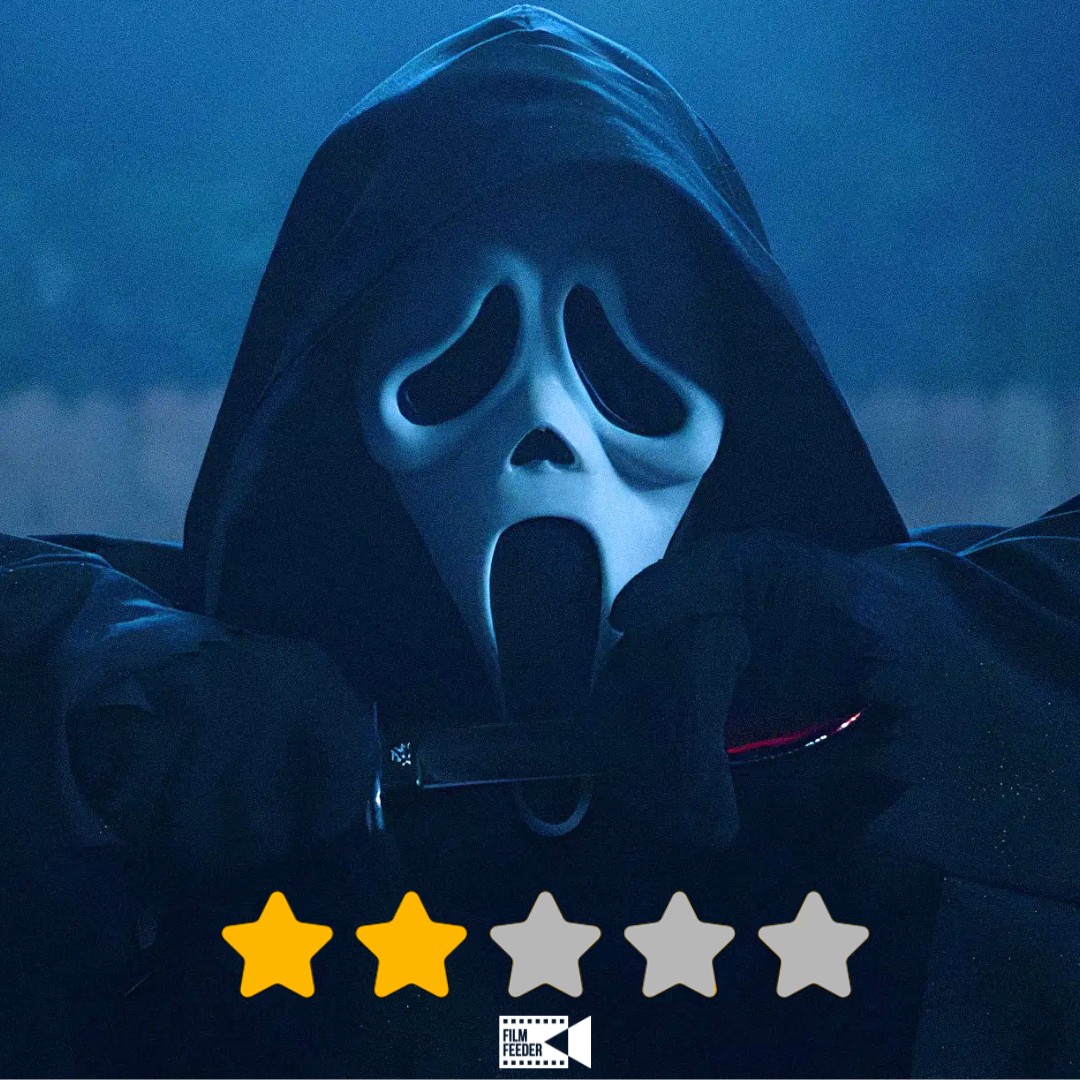

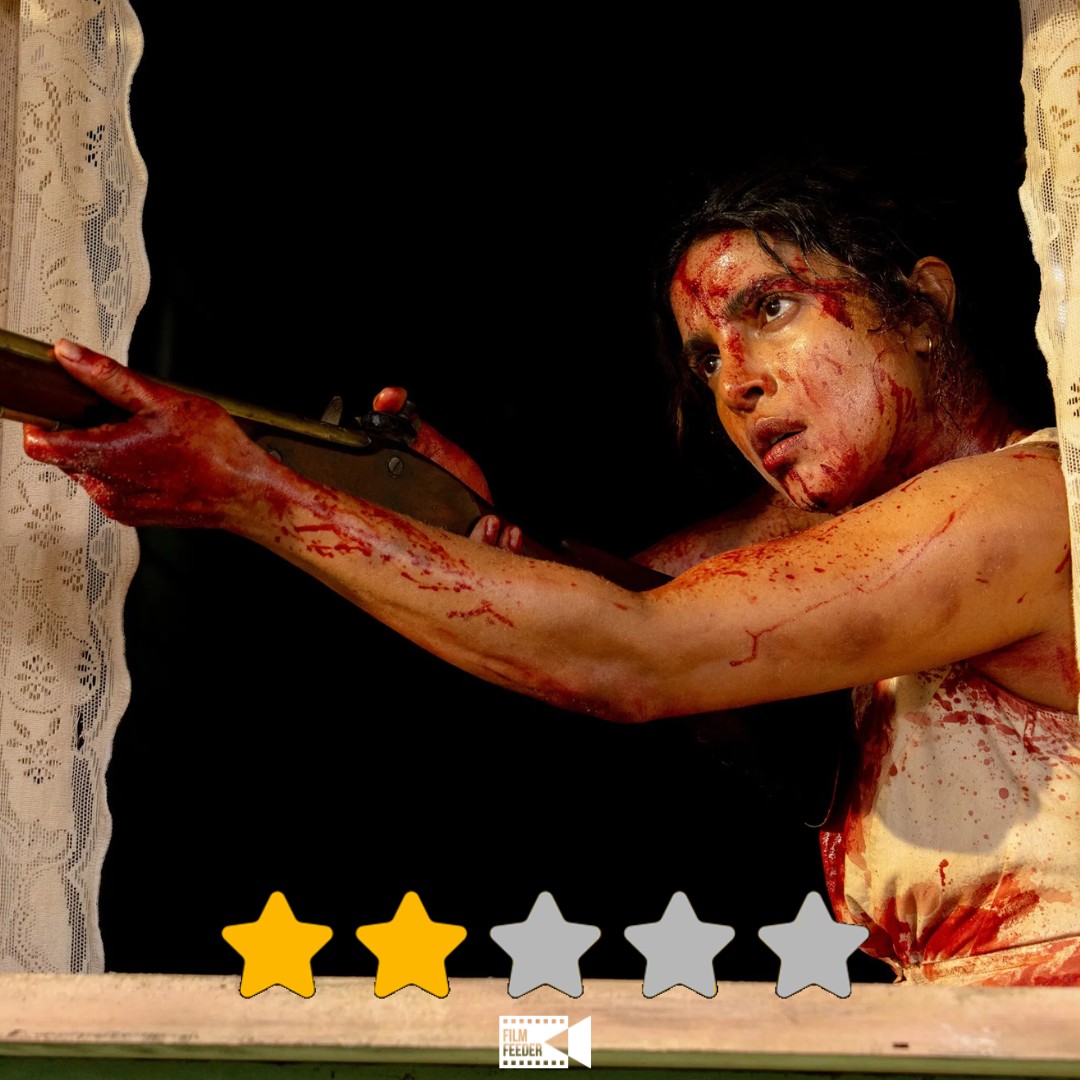
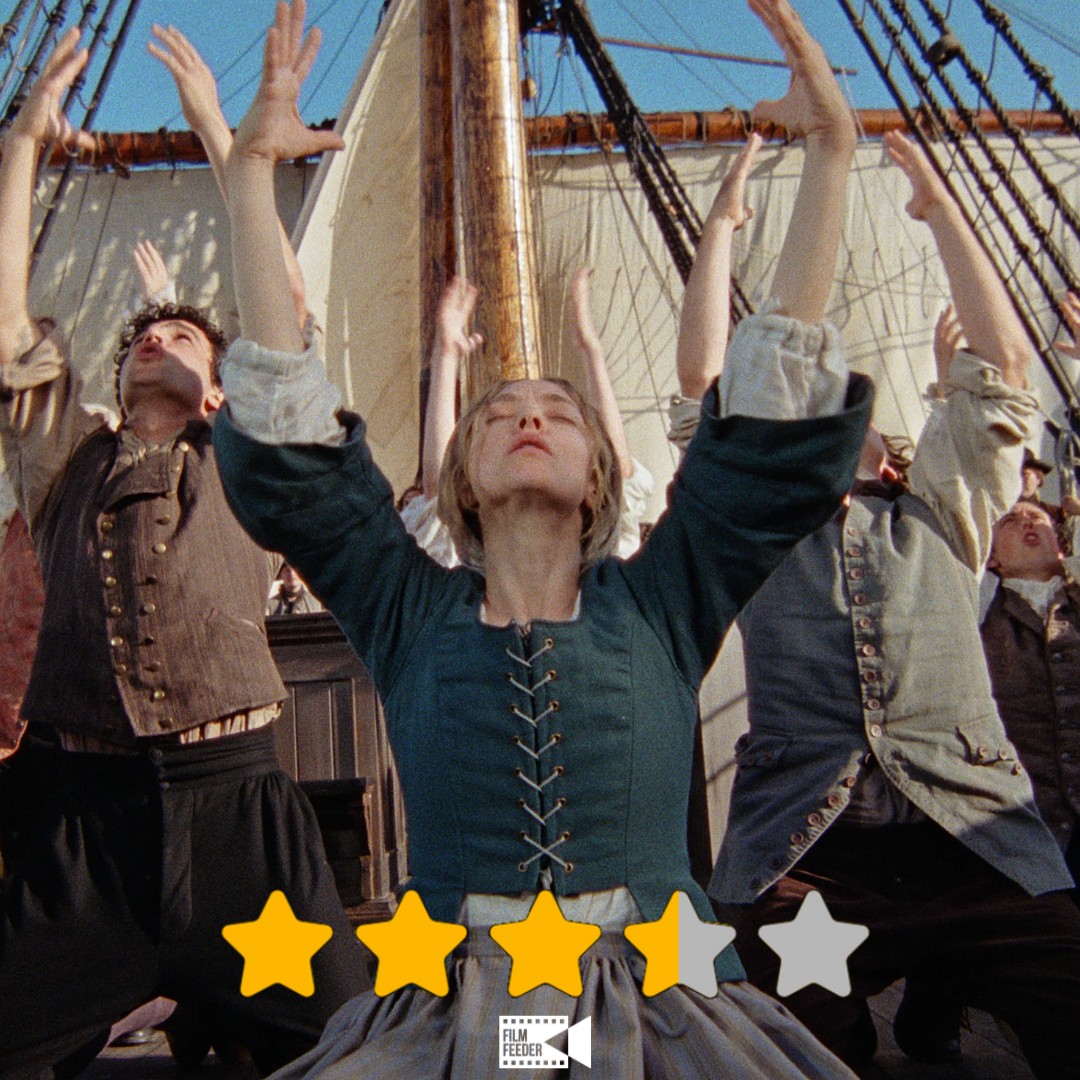
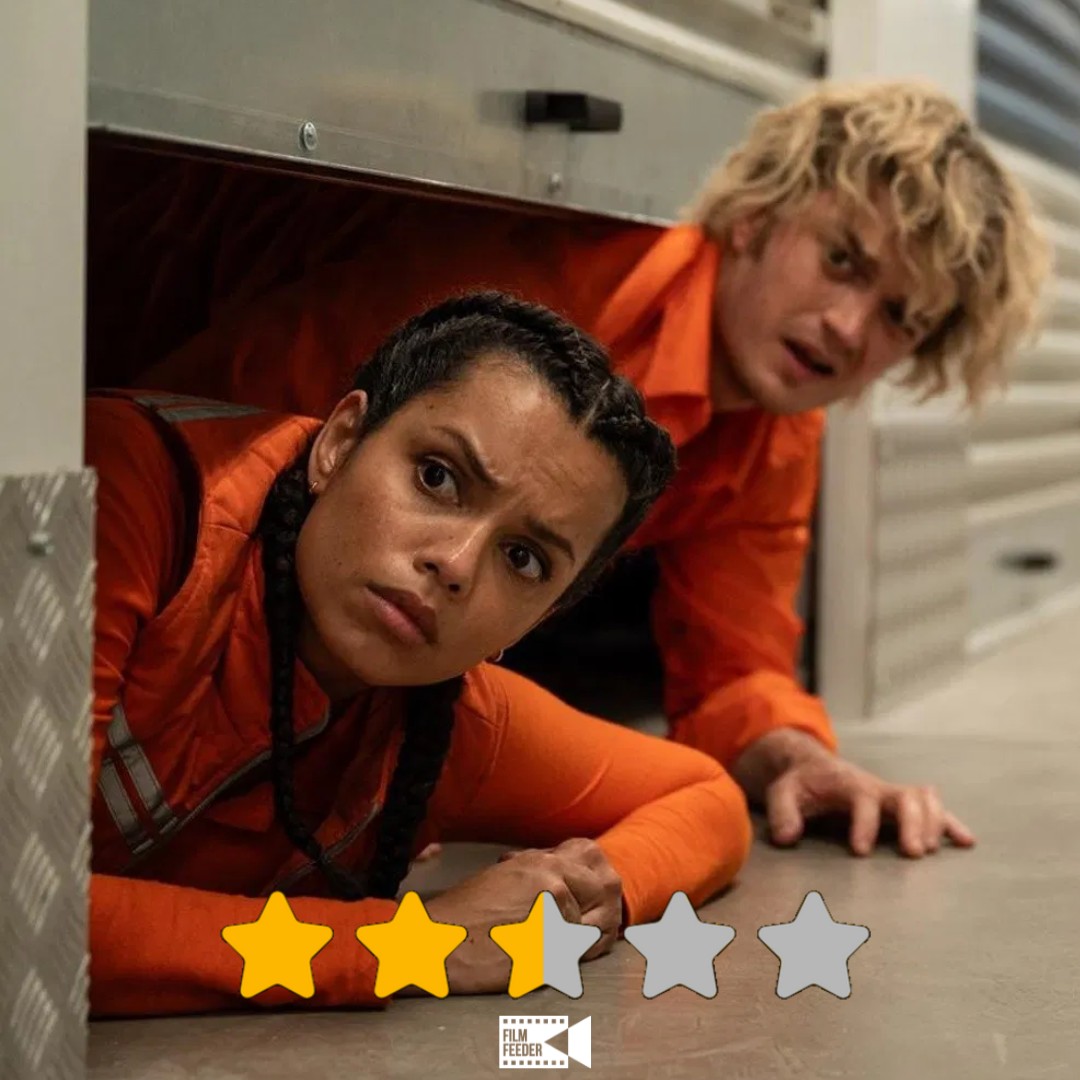

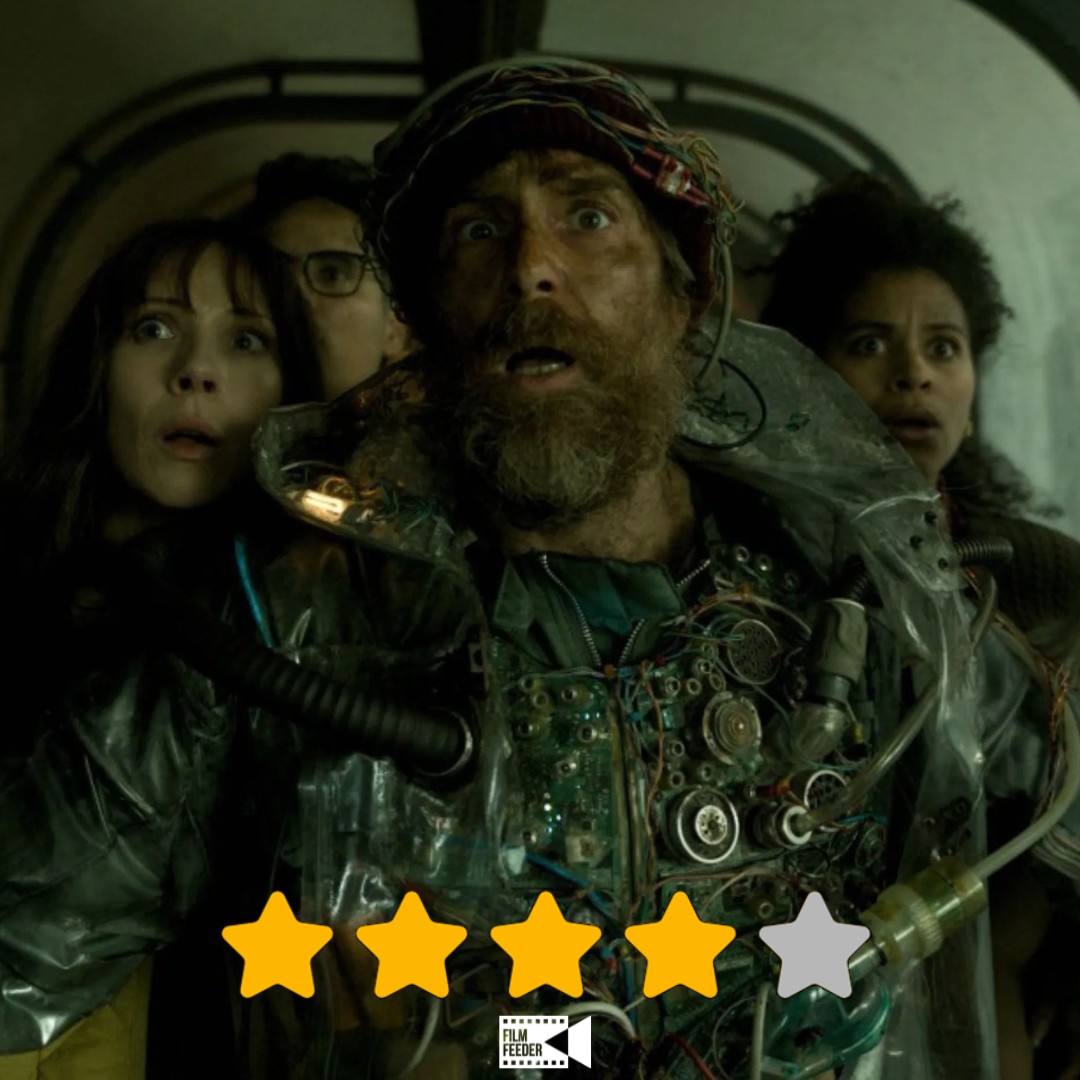
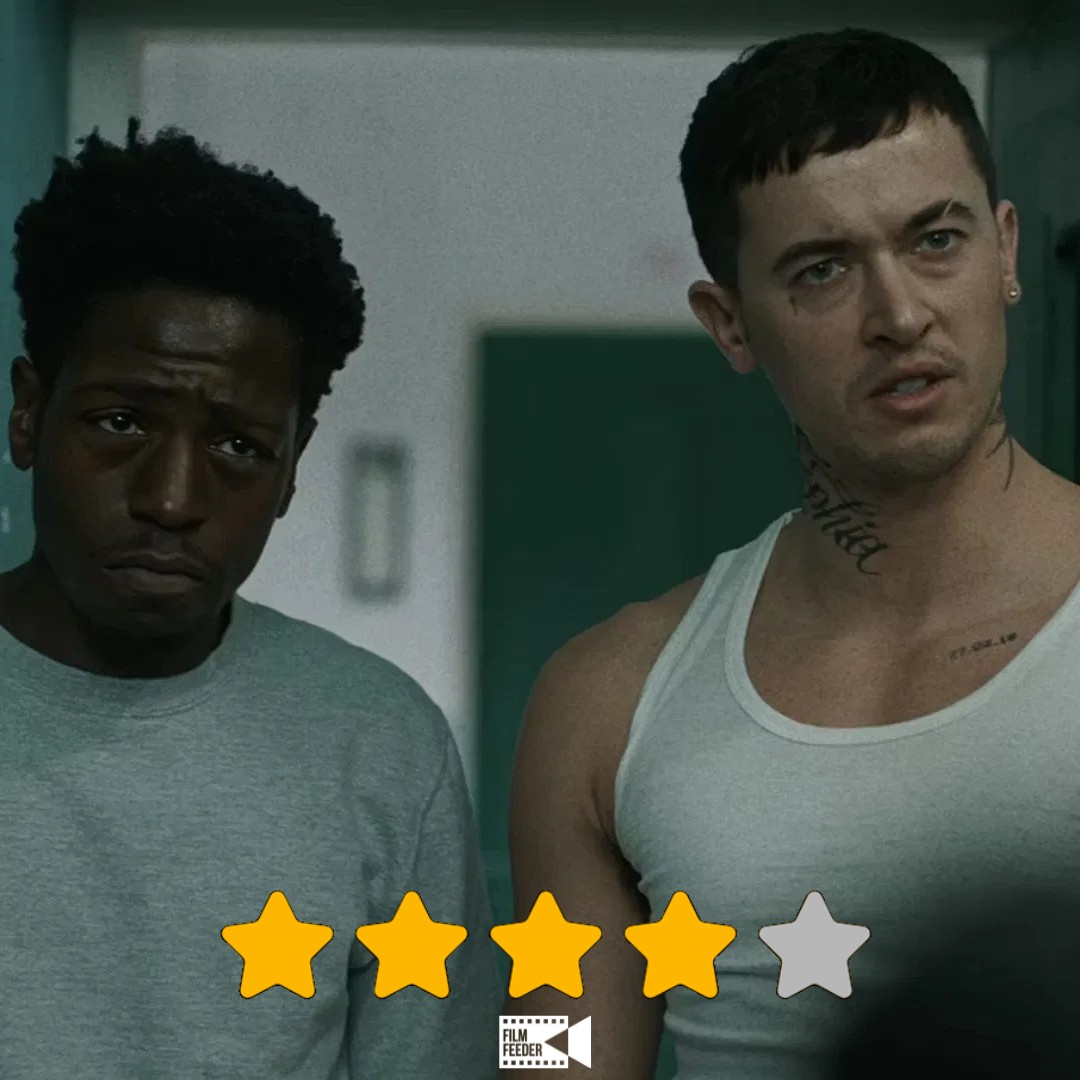
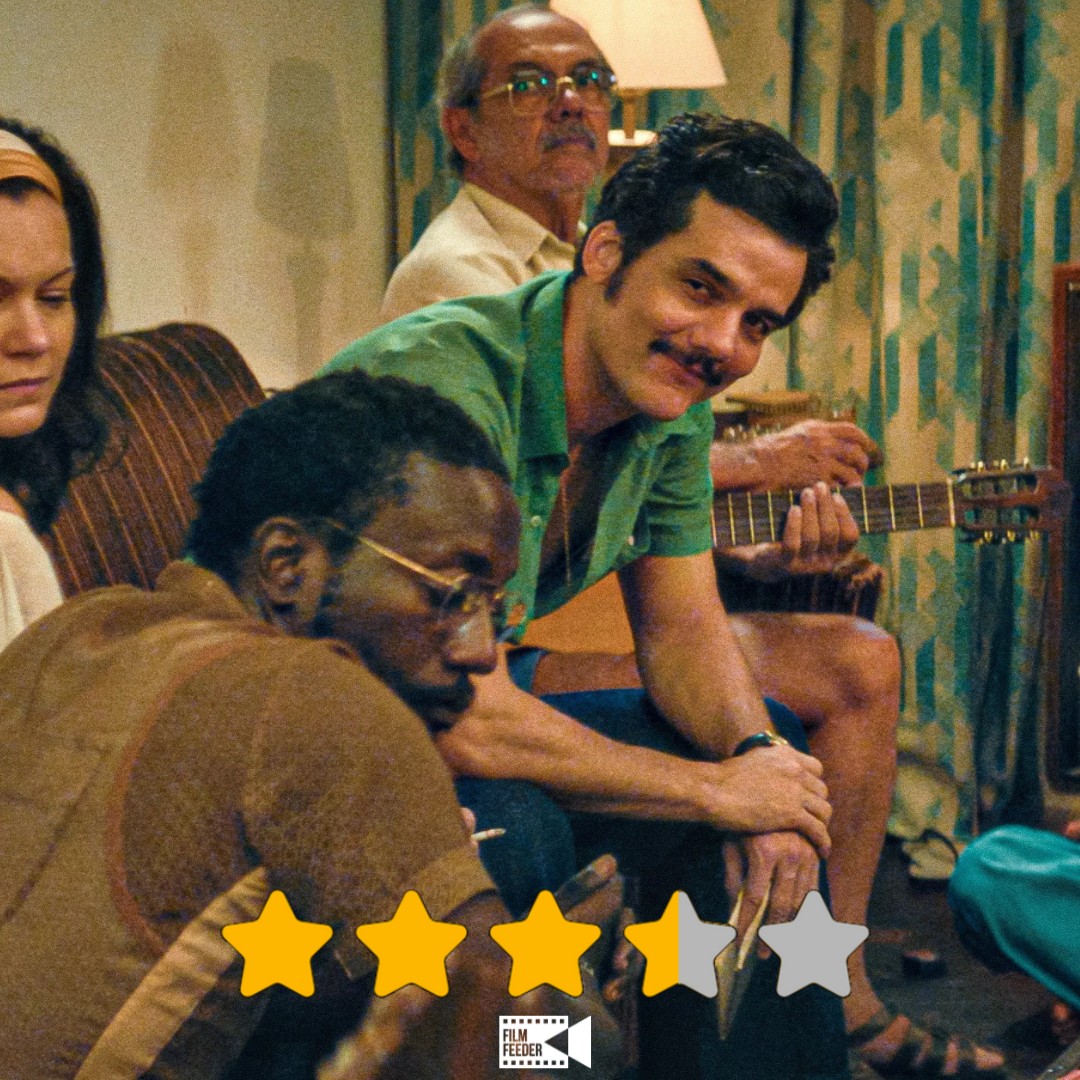
0 Comments